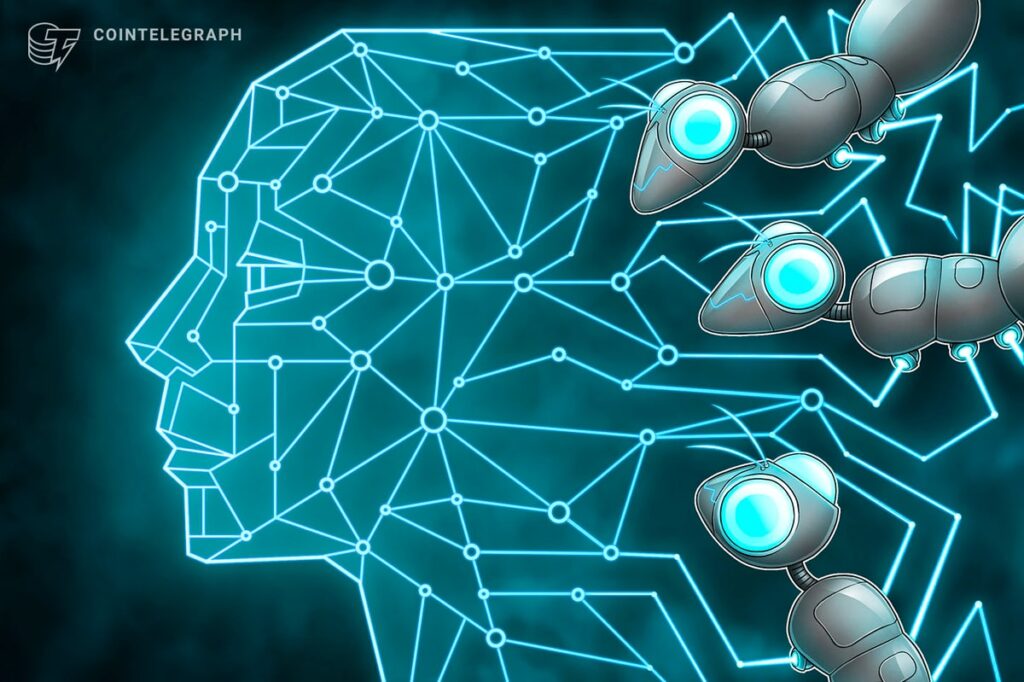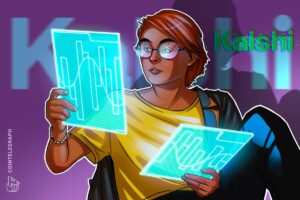Can blockchain provide safeguards to keep AI on track?

Artificial intelligence (AI) and blockchain are emerging digital technologies that have captured the public's imagination but raised concerns.
So the question must be asked: Can AI and blockchain merge in a way that benefits humanity?
There are reasons to think. In the year Until 2016, Vitalik Buterin wrote, both the cryptoeconomics and AI security communities were “trying to solve what is essentially the same problem” of how to control complex and smart systems with “unpredictable emergent behaviors”.
Both are based on the basic “dumb” systems “created at the same time and their properties do not change”. Once a smart contract is implemented, it cannot be changed, e.g. The two communities “need to listen more to each other,” he said.
In the past year, with the emergence of ChatGPT and other generative AI tools, there is growing concern that AI may be out of control. In a fantasy scenario, humans could lose control of autonomous weapons systems.
Thus, the notion that blockchains and smart contracts can somehow act as a buffer to stop AI models from veering off course is gaining currency.
“Anyone who works in crypto has a specific role to play in making AGI go well,” said Allison Duttman, president of the Foresight Institute, at the recent SmartCon 2023 conference. This is especially true given that artificial general intelligence, or AGI, where machines gain human-level intelligence, is predicted to arrive sooner rather than later.
This convergence of AI and blockchain technology was on the minds of IT decision makers who participated in a recently released study by Casper Labs. Nearly half (48%) of 608 IT leaders surveyed across the United States, Europe and China agreed that “the integration of AI and blockchain technology has the potential to revolutionize our industry, with improved data security, transparency and efficiency.”
More technologies, increasing speed
The basic idea is that blockchain's immutable, tamper-proof ledgers, along with smart contracts, can provide safeguards for AI applications, ensuring responsible artificial intelligence. Some believe blockchain could act as a sort of “kill switch” for uncontrolled AI models.
In a Casper Labs-commissioned study by Zogby Analytics, 71% of IT leaders said they “view blockchain and AI as complementary technologies.” Additionally, when asked how their organizations currently use blockchain, “working effectively with AI was the most popular response overall (51%).
Elsewhere, on November 1, US President Joe Biden issued an executive order establishing new AI safety and security standards. The order aims to protect the public from various threats, including dangerous AI-engineered biological materials, AI-enabled fraud and deception.
That order “created a lot of momentum,” Mrinal Manohar, CEO and co-founder of Casper Labs, a Layer-1 blockchain focused on businesses, told Cointelegraph in an interview. AI management is on the minds of many enterprise IT people these days.
Have you seen more businesses launching actual AI/blockchain projects? “We expect 2024 to be a big year for POCs. [proofs-of-concept] and MVPs [minimum viable products]. And I guess there will be real use cases after that,” Manohar said.
But there are definitely obstacles here, including distortion. Despite recent progress, verifying transactions in large-scale decentralized blockchains remains a challenge.
In the oft-cited 2021 paper, Ben Garfinkle, director of the Center for AI Governance, wrote, “Established permissionless blockchains, including Ethereum, are too inefficient to run anything beyond simple applications.” The app is even “pushing Ethereum's current limits to check who won a game of chess.
Magazine: Breaking into Liberland: Hiding Guards with Inner Tubes, Decoys and Diplomats
Still, if smart contracts are “secure enough,” Garfinkel allows, they could be useful as validation mechanisms for international agreements aimed at governing AI systems.
Casper Labs is clearly more optimistic. “In the race to solve the AI 'black box' challenge, blockchain is emerging as the all-in-one solution we've been waiting for to incorporate the much-needed transparency. The inner workings of AI systems are essentially invisible to users, hence the ‘black box' analogy,” Manohar said in the report.
The hybrid blockchain solution
Still, how can blockchain technology be seen as a solution to the AI ”black box” problem if it can't even scale?
“The way to solve the scale problem is through hybrid blockchains,” Manohar told Cointelegraph. “Today, no one is talking about putting huge data sets on Ethereum or Casper Labs' own layer-1 blockchain. Casper Labs' solution is both permissioned (private) blockchains and public (unpermissioned) blockchains.” It involves using
“People have forced themselves into this mindset that you have to get total consent or you have to be completely open,” Manohar continues, explaining:
“In hybrid blockchain, you have your own private blockchain. You control it, you configure it, and you can make it run as fast as you want because you have a certain set of validators.
And public chain? This is more for version control and record keeping. On a public chain, for example, you might want to register a new version of AI. “The beauty of this hybrid model is when you want something immutable from a public chain and you can choose when to manage your infrastructure yourself,” Manohar said.
As long as you store enough of the reference on the public blockchain, “you can always verify that the data hasn't been tampered with because if it's tampered with, the hash won't match.”
Also, anything that can be audited, you can do it on the public blockchain because it's not tampered with. So “every time I modify the AI or use a new dataset, I send a ping to the public blockchain,” Manohar said.
A big problem with AI today is that it doesn't know when someone is doing something wrong. But since blockchains are highly serialized and time-stamped, they provide a way to recover the tape.
So, if an AI model “starts to show signs of hallucinations or internal biases, you can simply roll the AI system back to a recent iteration that didn't have those problems, and then investigate where the problem data came from,” Casper Labs explains. website.
But others are not convinced that blockchain will solve the AI ”black box” problem.
“To describe blockchain's ‘transparency' as a cure for AI's ‘black box' problem is misleading,” Samir Rawashdeh, associate professor and director of the University of Michigan's Dearborn Artificial Intelligence Research Center, told Cointelegraph.
It doesn't make the inner workings of a machine learning model more understandable, or “makes it clear how a particular result can be traced back to the original training data.”
What Casper Labs actually proposes is that Rawashdeh is a “version control system” that – although it has some cool features – can be used to “track the development and deployment of an AI model.”
That said, blockchain can indirectly solve the “black box” challenge, Rawashdeh added, by providing an audit trail that helps ensure data integrity and accuracy and transparency in datasets used to train AI models. But it doesn't make the actual decision-making process any more meaningful.
When machines combine with people
Looking ahead, concerns arise around artificial general intelligence: Can blockchain help avoid nightmare scenarios where AGI models overturn elections or prosecute wars?
“It can actually help a lot,” Manohar replied. “Blockchain will be the best kill switch” for the AI model if electricity “goes through a completely decentralized blockchain.”
That is, the blockchain and its human verifiers decide whether or not to accept the power of the AI model. “There's always a kill switch signal, if all validators agree, they can shut down the network, shut down the AI's power supply,” Manohar said.
“It can actually be used as an incredibly powerful kill switch for those nightmare scenarios.”
Doubts remain.
There are other obstacles to this integration of blockchain and AI. For one thing, “there's a lot of skepticism around crypto in the AI community,” Duetmann said. Crypto and Blockchain still bring to mind token scams and other unsavory behavior for many.
That said, when asked if Foresight is seeing more funding ideas for AI/Blockchain projects, Duetmann replied: “There's a lot going on in the space right now. She is seeing an average of about five funding proposals that combine blockchain and AI technology. Of course, the institute can only fund a few of these, but “certainly a lot has been directed.”
As for the two communities, she said, “They ultimately have a lot to learn from each other.” In her talk at SmartCon 2023, she explained that the crypto industry is very good at network security, often employing “red teams” to search for resources that cause malicious behavior. “We'll extend the ‘red team' to machine learning models,” she suggested.
More accepted in China
Integrating AI and blockchain technology seems to be particularly well-received in China. In a Casper Lab study, 68 percent of Chinese IT respondents said “the integration of AI and blockchain technology has the potential to transform our industry, with improved data security, transparency and efficiency. By comparison, that share was only 48% in the US and 34% in Europe.
Latest: Increasing Blockchain Adoption by Putting Technology on the Back End
Why is it higher in China? China has been hostile to cryptocurrencies in recent years but has a positive stance on blockchain technology, Manohar said. Some municipalities have placed land documents on the blockchain. China sees blockchain technology as an effective certification and traceability system.
In the West, by comparison, “everyone thinks blockchain is just cryptocurrency,” asserts Manohar. But this education gap can narrow. In the long run, “everything returns to the mean.”
Is this blockchain a killer app?
Manohar was asked whether the integration of AI and blockchain could eventually become the long-sought “killer app” in blockchain.
“It might be one of them,” he replied. The supply chain and financial technology sectors are also candidates for blockchain's track and trace governance protocols, but those two areas had passable governance before the advent of blockchain and smart contracts.
In comparison, “there is no current governance system in AI. Therefore, there is much more room for creativity. So I think this could be the killer application of blockchain,” he told Cointelegraph.














